Subaru Legacy: Cooling system
 Subaru Legacy: Cooling system
Subaru Legacy: Cooling system
WARNING
Never attempt to remove the radiator cap until the engine has been shut off and has cooled down completely. Since the coolant is under pressure, you may suffer serious burns from a spray of boiling hot coolant when the cap is removed.
CAUTION
● Vehicles are filled at the factory with SUBARU Super Coolant that does not require the first change for 11 years/137,500 miles (11 years/220,000 km). This coolant should not be mixed with any other brand or type of coolant during this period. Mixing with a different coolant will reduce the life of the coolant. Should it be necessary to top off the coolant for any reason, use only SUBARU Super Coolant.
If the SUBARU Super Coolant is diluted with another brand or type, the maintenance interval is shortened to that of the mixing coolant.
● Do not splash the engine coolant over painted parts. The alcohol contained in the engine coolant may damage the paint surface.
Cooling fan, hose and connections
Your vehicle employs an electric cooling fan which is thermostatically controlled to operate when the engine coolant reaches a specific temperature.
If the radiator cooling fan does not operate even when the coolant temperature high warning light illuminates, the cooling fan circuit may be defective. Check the fuse and replace it if necessary. Refer to “Fuses” F11-46 and “Fuses and circuits” F12-10. If the fuse is not blown, have the cooling system checked by your SUBARU dealer.
If frequent addition of coolant is necessary, there may be a leak in the engine cooling system. It is recommended that the cooling system and connections be checked for leaks, damage, or looseness.
Engine coolant
Checking the coolant level
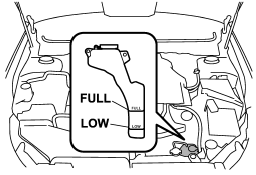
Check the coolant level at each fuel stop.
1. Check the coolant level on the outside of the reservoir while the engine is
cool.
2. If the level is close to or lower than the “LOW” level mark, add coolant up to
the “FULL” level mark. If the reserve tank is empty, remove the radiator cap and
refill as required.
3. After refilling the reserve tank and the radiator, reinstall the caps and check
that the rubber gaskets inside the radiator cap are in the proper position.
Check the coolant level at each fuel stop.
1. Check the coolant level on the outside of the reservoir while the engine is
cool.
2. If the level is close to or lower than the “LOW” level mark, add coolant up to
the “FULL” level mark. If the reserve tank is empty, remove the radiator cap and
refill as required.
3. After refilling the reserve tank and the radiator, reinstall the caps and check
that the rubber gaskets inside the radiator cap are in the proper position.
CAUTION
● Be careful not to spill engine coolant when adding it. If coolant touches the exhaust pipe, it may cause a bad smell, smoke, and/or a fire. If engine coolant gets on the exhaust pipe, be sure to wipe it off.
● Do not splash the engine coolant over painted parts. The alcohol contained in the engine coolant may damage the paint surface.
Changing the coolant
WARNING
Never attempt to remove the radiator cap until the engine has been shut off and has cooled down completely. Since the coolant is under pressure, you may suffer serious burns from a spray of boiling hot coolant when the cap is removed.
Always add genuine SUBARU cooling system conditioner whenever the coolant is replaced.
Change the engine coolant and add genuine SUBARU cooling system conditioner using the following procedures according to the maintenance schedule in the “Warranty and Maintenance Booklet”.
1. Remove the under cover.
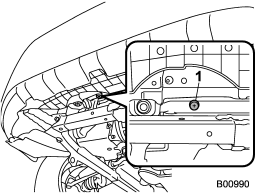
2.5 L models
1) Drain plug
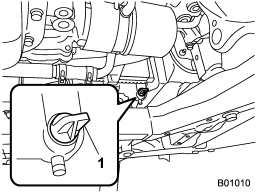
3.6 L models
1) Drain plug
2. Place a proper container under the drain plug and loosen the drain plug.
3. Loosen the radiator cap to drain the coolant from the radiator. Then drain the coolant from the reserve tank. Tighten the drain plug securely.
4. Install the under cover.
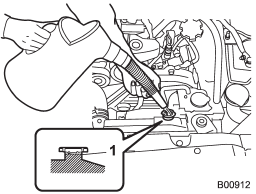
1) Fill up to here
5. Slowly pour the coolant and fill up to just below the filler neck, allowing enough room to add genuine SUBARU cooling system conditioner in the radiator. Add genuine SUBARU cooling system conditioner until the coolant level reaches the filler neck. Do not pour the coolant too quickly, as this may lead to insufficient air bleeding and trapped air in the system.
NOTE
For guidelines on coolant quantity (including the coolant in the reservoir tank), refer to “Engine coolant” F12-7.
CAUTION
● Be careful not to spill engine coolant when adding it. If coolant touches the exhaust pipe, it may cause a bad smell, smoke, and/or a fire. If engine coolant gets on the exhaust pipe, be sure to wipe it off.
● Do not splash the engine coolant over painted parts. The alcohol contained in the engine coolant may damage the paint surface.
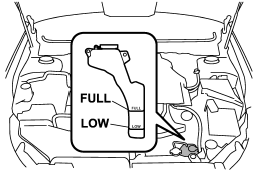
6. Pour the coolant and fill to the reservoir tank’s “FULL” level mark.
7. Put the radiator cap back on and tighten firmly. At this time, make sure that
the rubber gasket in the radiator cap is correctly in place.
8. Start and race the engine at 2,000 to 3,000 rpm for 5 to 6 times within 40 seconds.
9. Stop the engine and wait until the coolant cools down (122 to 1408F [50 to 608C]).
If there is any loss of coolant, add coolant to the radiator’s filler neck and to
the reserve tank’s “FULL” level.
10. Put the radiator cap and reservoir cap back on and tighten firmly.


